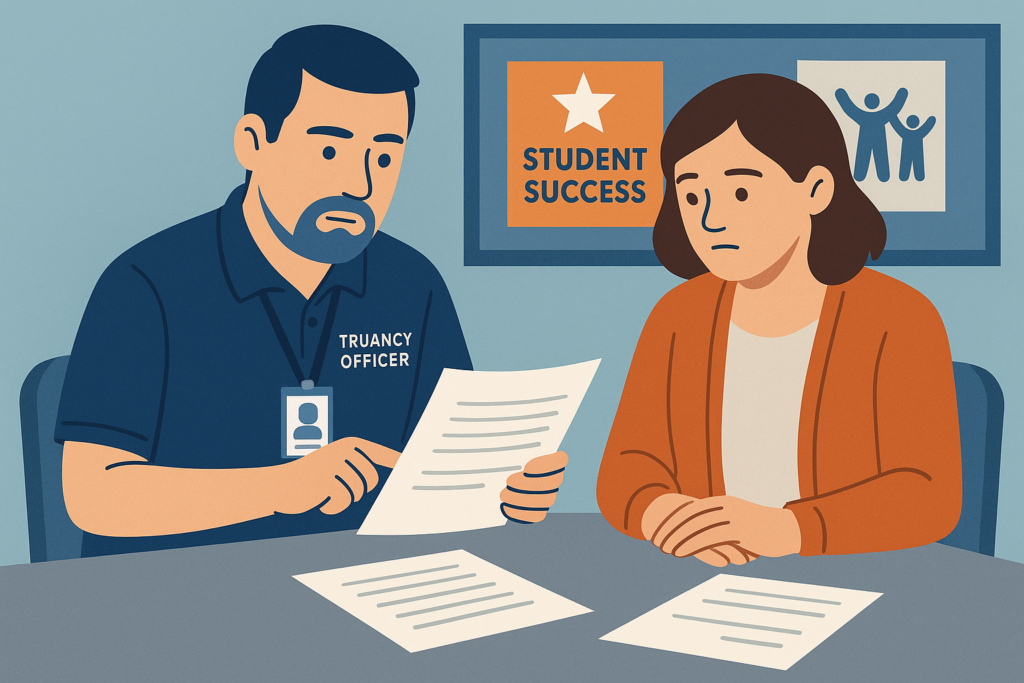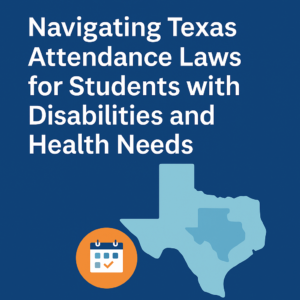Florida has strict attendance laws—but for families dealing with anxiety-driven school avoidance, the system can feel more punitive than supportive. Understanding the law, your rights, and how to work with truancy officers is essential.
Florida’s truancy law can turn school absences into legal battles, even for children who are missing school due to anxiety, medical needs, or disability. If your child has five or more unexcused absences in a calendar month—or 15 in a 90-day period—you could face court, fines, or mandated programs. But enforcement isn’t black-and-white. This article breaks down the legal process, the role of truancy officers, how Florida law defines noncompliance, and what families can do to advocate for support—not punishment.
1. What is the Truancy Law in Florida?
Florida Statute §1003.26 outlines the state’s compulsory school attendance law. Children ages 6 to 16 are legally required to attend school regularly. If a student accumulates:
- 5 unexcused absences in one month, or
- 15 unexcused absences in a 90-day period, schools must initiate an investigation.
This often triggers involvement from a truancy officer or attendance team, and can ultimately lead to truancy court, civil citations, or even jail time for parents if the issue isn’t resolved.
2. What Counts as an “Unexcused” Absence?
Florida leaves some discretion to individual school districts, but in general, absences are unexcused if they:
- Aren’t accompanied by a doctor’s note
- Aren’t approved by the school
- Don’t fit within recognized religious or family emergency exceptions
School refusal due to mental health or anxiety is often not automatically excused unless properly documented through medical or psychological evaluation.

3. The Role of the Truancy Officer in Florida
In Florida, truancy officers—sometimes called attendance officers or school resource officers—are the frontline enforcers of these laws. Their tasks include:
- Investigating attendance violations
- Meeting with families to develop a truancy intervention plan
- Referring cases to the state attorney’s office if interventions fail
- Representing schools during court proceedings
Some truancy officers work in tandem with guidance counselors; others take a more enforcement-oriented role depending on the district.

4. The Truancy Court Process in Florida (Expanded)
When interventions fail—or if schools determine there’s insufficient family cooperation—the case can be referred to truancy court. Here’s what typically happens:
- Referral to Truancy Court
After the school exhausts internal interventions (like attendance contracts or behavior plans), it can refer the case to the State Attorney’s Office for legal follow-up. - Notice to Appear
The parent or guardian receives a notice, often requiring appearance before a truancy magistrate or juvenile court judge. - Court Appearance
During the court hearing, the truancy officer presents attendance records, and the parent is asked to explain the absences. If the judge finds fault, consequences can include:- Parenting classes
- Mandatory counseling
- Community service
- In rare cases, jail time or loss of public assistance
- Parenting classes
Court Order Compliance
Failure to comply with the court’s recommendations can result in escalating legal penalties.

5. Common Mistakes Florida Parents Make (Expanded)
Many parents unintentionally make their situation worse due to misinformation or fear. Here’s what to avoid:
- Ignoring Early Outreach
If the school sends letters or requests a meeting, respond immediately. Ignoring it can accelerate court referrals. - Failing to Document Mental Health Needs
Without therapist letters, evaluations, or diagnoses on file, anxiety-driven absences may be treated as defiance. Don’t assume the school knows your child’s needs. - Assuming the Officer Is Against You
Truancy officers are bound by policy but may offer resources. Families that approach them with hostility often face stricter oversight.
Not Asking for a 504 or IEP Evaluation
Many students with anxiety or school refusal qualify for accommodations that can change how attendance is handled legally.
6. How to Work With a Truancy Officer in Florida (Expanded)
The truancy officer may feel like an enforcer, but it’s possible to reframe the dynamic as collaborative. Here’s how:
Mindset First
Approach with a mindset of strategic empathy. Assume the truancy officer is operating with limited information—and offer yours constructively. You don’t need to be submissive; you need to be prepared.
Speak in Evidence
Don’t just describe the problem—document it. Bring in therapist notes, emails with the school, daily symptom logs, and anything that shows your proactive approach.
Ask Smart Questions
Examples:
- “What alternatives to court are available for medically related absences?”
- “Can we escalate this to a student services team or request a 504 plan?”
Establish Your Own Paper Trail
After every conversation, follow up in writing:
“Thank you for our conversation today. As discussed, I will submit updated documentation from our therapist.”
Position Yourself as a Problem-Solver
Make it clear that you’re seeking solutions, not dodging accountability:
“We want our child to be in school—but anxiety is the barrier. We’re committed to resolving it, with your help.”

7. What Needs to Change in Florida’s Truancy Policy
Florida’s current framework too often penalizes families with legitimate mental health barriers. Reform is needed in several key areas:
- Broader Definition of “Excused”
Mental health should be recognized explicitly, not left to individual discretion. - More Training for Truancy Officers
- Officers should be trained in trauma-informed care and school refusal strategies.
- Early Intervention Incentives
- Schools should be encouraged to identify and intervene before absences reach legal thresholds.
Cross-Agency Collaboration
Truancy responses should include counselors, social workers, and mental health professionals—not just administrators and officers.
Conclusion: Don’t Face Truancy Alone
Florida’s truancy laws are rigid—but they are navigable with knowledge, documentation, and strategic advocacy. Truancy officers play a dual role: when approached correctly, they can become partners in resolution—not just messengers of punishment.
Whether you’re early in the process or facing a court date, remember: you have rights, your child has needs, and there is a path to support.






